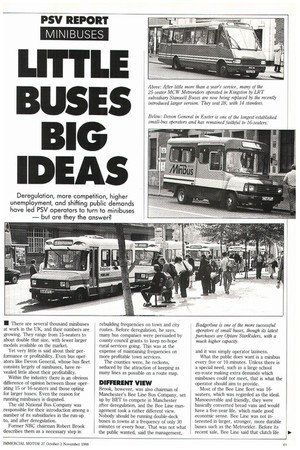LITTLE BUSES BIG IDEAS
Page 51

If you've noticed an error in this article please click here to report it so we can fix it.
Deregulation, more competition, higher unemployment, and shifting public demands have led PSV operators to turn to minibuses — but are they the answer?
• There are several thousand minibuses at work in the UK, and their numbers are growing. They range from 15-seaters to about double that size, with fewer larger models available on the market.
Yet very little is said about their performance or profitability. Even bus operators like Devon General, whose bus fleet consists largely of minibuses, have revealed little about their profitability.
Within the industry there is an obvious difference of opinion between those operating 15 or 16-seaters and those opting for larger buses. Even the reason for running minibuses is disputed.
The old National Bus Company was responsible for their introduction among a number of its subsidiaries in the run-up to, and after deregulation.
Former NBC chairman Robert Brook describes them as a necessary step in rebuilding frequencies on town and city routes. Before deregulation, he says, many bus companies were persuaded by county council grants to keep no-hope rural services going. This was at the expense of maintaining frequencies on more profitable town services.
The counties were, he reckons, seduced by the attraction of keeping as many lines as possible on a route map.
DIFFERENT VIEW
Brook, however, was also chairman of Manchester's Bee Line Bus Company, set up by BET to compete in Manchester after deregulation, and the Bee Line management took a rather different view. Nobody should be running double-deck buses in towns at a frequency of only 30 minutes or every hour. That was not what the public wanted, said the management, Badgerline is one of the more successful operators of small buses, though its latest purchases are Optare StarRiders, with a much higher capacity.
and it was simply operator laziness.
What the public does want is a minibus every five or 10 minutes. Unless there is a special need, such as a large school en-route making extra demands which minibuses could not meet, that is what the operator should aim to provide.
Most of the Bee Line fleet was 16seaters, which was regarded as the ideal. Manoeuvrable and friendly, they were basically converted bread vans and would have a five-year life, which made good economic sense. Bee Line was not interested in larger, stronger, more durable buses such as the Metrorider. Before its recent sale, Bee Line said that clutch life














































































